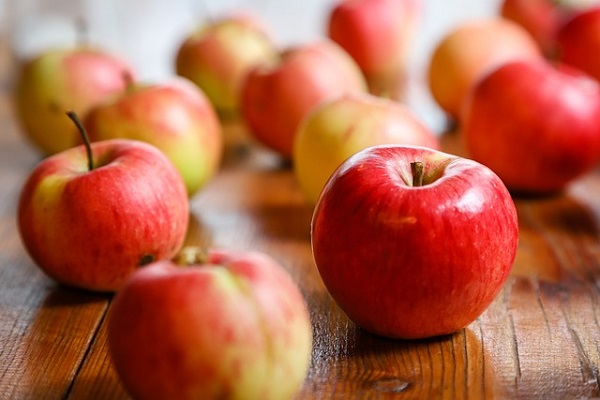Words: Team ThinkWellness360
The apple, as The Encylopedia of Foods puts it, is a pome round fruit that consists of firm, juicy flesh covered by a thin, tough, edible skin and surrounding a cartilaginous, seeded core. The skin colour of apples can range from dark green to yellow to bright red, or some combination of these colours. Apples that are just ripe are crisp and juicy, whereas those that are overripe attain an aromatic flavour and a slightly mealy texture.
Apples are a rich source of soluble and insoluble fibre, vitamin C, flavonoids and anti-oxidants. Eating a nourishing apple every day not only keeps illnesses at bay, but it also boosts our overall health and well-being.
Asthma. A study has shown that children with asthma, who made it a habit to drink apple juice every day, had fewer wheezing episodes than children who drank apple juice only once a month. Another study showed that children born to women who ate a lot of apples during pregnancy had lower rates of asthma than children whose mothers ate few apples.
Bone. Research in France reports that a flavonoid, phloridzin, found only in apples may protect post-menopausal women from osteoporosis. This also suggests that the fruit may increase bone density.
Brain. Research at Cornell University, US, has found that the phytonutrient, quercetin, in apples may protect brain cells and reduce the risk of Alzheimer’s disease [memory loss].
Cancer. A research study reports that people who ate the most apples had a 50 per cent lower risk of developing lung cancer. A Cornell University study found that rats that were fed one apple a day reduced their risk of breast cancer by 17 per cent. Rats fed three apples a day reduced their risk by 39 per cent; and, those who were fed six apples a day reduced their risk by 44 per cent. Yet another study found that rats put on a diet containing apple skin extract had a 43 per cent lower risk of colon cancer. This isn’t all — a study also suggests that pectin in apples reduces the risk of colon cancer and helps maintain a healthy gut. Research has found that rats given apple skin extract had a 57 per cent lower risk of liver cancer too.
Cholesterol. Research shows that pectin in apples lowers LDL [‘bad’] cholesterol. People who eat two apples a day may lower their cholesterol by 16 per cent.
Diabetes. Pectin in apples is evidenced to lower the body’s need for insulin and, thus, helps in the management of diabetes.
Weight Management. A Brazilian research study has found that women who ate three apples a day lost more weight, while dieting, than women who did not eat the fruit while dieting.
Uses
When selecting apples, choose them having firm flesh and tight skin, free of bruises, soft spots, and holes. Larger apples tend to be mealy than small apples. To ripen apples, keep them at room temperature. Apples store well for long periods refrigerated, or in a cool, dry place.
Sliced apples quickly turn brown on exposure to air; however, this can be prevented by dipping the fruit into acidulated water [dilute lemon juice]. As one of the most popular fruits, apples are used in salads, alongside meats, desserts, preserves, juices, cider, pies, breads, cakes, and beverages. Dried apples make tasty snacks, or accompaniments to breakfast cereal.

